| Srl | Item |
| 1 |
ID:
129910
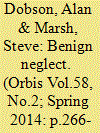

|
|
|
|
|
| Publication |
2014.
|
| Summary/Abstract |
The United States can ill afford to lose the loyalty of proven allies. Yet it risks currently weakening one of its most important and enduring friendships. British popular support for America has been shaken and elite commitment to the special relationship faces a potentially formidable array of contrary strategic and partisan arguments. Some of these are overstated but there is a further danger that is little mentioned but just as corrosive-American benign neglect. If in the pursuit of new allies and objectives America is not to squander extant assets, then it must do more to nurture the reflexive British Atlanticism that has helped sustain Anglo-American relations through their numerous crises.
|
|
|
|
|
|
|
|
|
|
|
|
|
|
|
|
| 2 |
ID:
129909
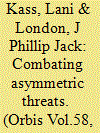

|
|
|
|
|
| Publication |
2014.
|
| Summary/Abstract |
The overarching objective of this analysis is to examine the ways and means by which the United States could take the asymmetric battle-space and win against the ever-changing array of threats posed by nation-states and non-state actors. Today's security challenges are predominantly hybrids: offense and defense; symmetric and asymmetric; synchronous and asynchronous; regular and irregular; geographically-focused and globally-ubiquitous. This reality requires multi-dimensional thinking, nuanced approaches, and nimble, decisive execution guided by a new strategic paradigm. Fighting on the enemy's terms, scoring short-term wins at unjustifiably high costs in lives, treasure and lost opportunities is simply unacceptable.
|
|
|
|
|
|
|
|
|
|
|
|
|
|
|
|
| 3 |
ID:
129908
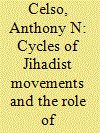

|
|
|
|
|
| Publication |
2014.
|
| Summary/Abstract |
The article argues that Islamist terror is driven by irrational forces; it analyzes jihadist values and doctrines that animate Islamic revolutionaries; it then contends that jihadist movements go through a cycle of mobilization, extremism, implosion and recreation. Finally, it assesses the prospects for jihadist revitalization, extremism, and decline in Syria and the Sahel. Examples from the Iraqi and Algerian jihadist campaigns are used for illustrative purposes throughout.
|
|
|
|
|
|
|
|
|
|
|
|
|
|
|
|
| 4 |
ID:
129912
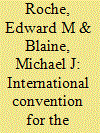

|
|
|
|
|
| Publication |
2014.
|
| Summary/Abstract |
Cyber weapons now are an extension of state power. In hopes of gaining a strategic advantage, many countries including the United States, Russia and China are developing offensive cyber capabilities to disrupt political, economic, and social institutions in competitor nations. These activities have led to a cyber arms race that is spiraling out of control. This imminent global threat challenges the international community to be proactive. The purpose of this article is to propose an international convention to throttle the development, proliferation and use of cyber weapons before they cause electronic Armageddon. We begin by examining three successful efforts in arms control and use the lessons learned to draft a convention that can serve as a starting point for formal multilateral negotiations.
|
|
|
|
|
|
|
|
|
|
|
|
|
|
|
|
| 5 |
ID:
129903
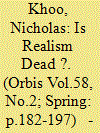

|
|
|
|
|
| Publication |
2014.
|
| Summary/Abstract |
The author contends that prominent strands in the recent literature on Asia's international relations reflect a lack of appreciation for the actual policy of regional states, which is deeply realist in orientation.
|
|
|
|
|
|
|
|
|
|
|
|
|
|
|
|
| 6 |
ID:
129906
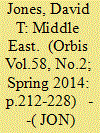

|
|
|
|
|
| Publication |
2014.
|
| Summary/Abstract |
The effort to bring peace to the Middle East has been an almost century long process. Legions of soldiers, politicians, and diplomats have attempted the political equivalent of transmuting dross into gold. They have failed; none more comprehensively than President Bill Clinton and his Middle East interlocutors. Despite personal energy, intelligence, and creativity, U.S. efforts failed. After a stretch of benign/malign neglect, Washington again is venturing into the swamp by sponsoring renewed Israeli-Palestinian negotiations. There are learnable lessons from what has been (mis)managed in the past. The question remains whether the United States will take counsel from them.
|
|
|
|
|
|
|
|
|
|
|
|
|
|
|
|
| 7 |
ID:
129905
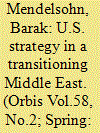

|
|
|
|
|
| Publication |
2014.
|
| Summary/Abstract |
In light of the uncertainty surrounding the Middle East stemming from the Arab Awakening, and the inability of Washington to shape the process of transition, U.S. decision- makers must rethink their strategy for the region in general and for counterterrorism in particular. Reducing U.S. involvement in the region and letting the dust settle will serve American interests better and allow for building healthier relations with Middle Eastern countries. At the same time, since the risk of negative effects on neighboring states that accompany transition must be kept in check, the United States, together with other powers, should lead the international community in reviving the principle of "state responsibility" as a productive way to reduce spillover of conflicts and even provide incentives for actors in the region to limit violence.
|
|
|
|
|
|
|
|
|
|
|
|
|
|
|
|